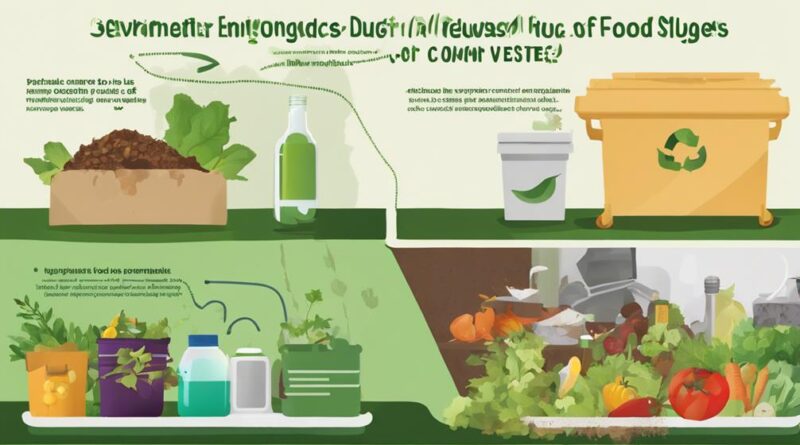Guide to Environment-Friendly Disposal of Food Waste
To dispose of food waste in an eco-friendly way, consider composting. It reduces landfill waste, enriches soil, and cuts greenhouse gas emissions. Fruit/veggie scraps, grains, dairy, meat, coffee grounds—these are all compostable. Set up indoor or outdoor composting for sustainability. Balance green and brown materials, avoid meat and dairy, and aerate regularly for successful composting. Try vermicomposting with worms for added efficiency. Bokashi composting, using microorganisms, accelerates decomposition. Utilize food waste for energy to minimize landfill impact. Community composting fosters shared responsibility. Consider these eco-friendly methods for a greener approach to food waste disposal.
Benefits of Composting Food Waste
Composting food waste not only reduces landfill waste but also enriches the soil with valuable nutrients for healthier plant growth. When you engage in sustainable gardening practices like composting, you contribute to the process of nutrient recycling. By composting your food waste, you're actively participating in a natural cycle that benefits both the environment and your garden.
Soil enrichment is a crucial aspect of sustainable gardening. When you compost food waste, you're essentially creating a nutrient-rich soil amendment that can enhance the quality of your soil. The organic matter from food waste improves soil structure, retains moisture, and provides essential nutrients for plant growth. This process not only reduces the need for chemical fertilizers but also promotes healthier and more robust plant development.
In addition to improving soil fertility, composting food waste helps in reducing landfill waste. Food scraps that end up in landfills produce methane, a potent greenhouse gas that contributes to climate change. By diverting food waste from landfills and turning it into compost, you're actively reducing greenhouse gas emissions and minimizing environmental harm.
Types of Organic Food Waste
Organic food waste can be categorized into various types based on its composition and source. Understanding the types of organic food waste is crucial for effective waste management strategies such as food composting and organic recycling. Here are the main types of organic food waste:
- Fruit and Vegetable Scraps: These include peels, cores, seeds, and other parts of fruits and vegetables that are typically discarded during meal preparation.
- Grains and Cereals: Leftover rice, pasta, bread, and other grain-based products fall into this category. These items can be recycled effectively through composting.
- Dairy Products: Milk, cheese, yogurt, and other dairy products that have gone bad or are no longer consumable contribute to organic waste.
- Meat and Fish Scraps: Bones, skins, fat, and other remnants from meat and fish can be challenging to dispose of but are essential to manage properly to prevent odors and pests.
- Coffee Grounds and Tea Bags: After brewing your morning cup of coffee or tea, the grounds and bags can be added to organic waste. These items are rich in nutrients and beneficial for composting.
Setting up a Composting System
To effectively manage different types of organic food waste, consider establishing a composting system at your home or workplace. Composting is a sustainable way to recycle food scraps and reduce the amount of waste that ends up in landfills. There are two main options to choose from when setting up a composting system: indoor composting and outdoor composting.
Indoor composting is a great choice if you have limited outdoor space or live in a climate where outdoor composting is challenging. DIY composting bins can easily be set up in your kitchen or pantry using airtight containers or specialized composting bins. These bins can help break down organic waste such as fruit and vegetable peels, coffee grounds, and eggshells, turning them into nutrient-rich soil for your plants.
On the other hand, outdoor composting is ideal for those with more space and access to a backyard or garden. You can choose between DIY composting setups using bins or piles, or opt for commercial composting systems that offer convenience and efficiency. Outdoor composting allows for larger quantities of food waste to be composted, including yard waste like leaves and grass clippings.
Whether you prefer indoor or outdoor composting, setting up a composting system is a proactive step towards reducing food waste and supporting a more sustainable environment.
Composting Dos and Don'ts
Consider these essential guidelines for successful composting practices. Composting is a fantastic way to reduce the environmental impact of food waste disposal. To make the most of your composting efforts, here are some dos and don'ts to keep in mind:
- Do: Balance your compost with a mix of green (nitrogen-rich) and brown (carbon-rich) materials. This ensures proper decomposition and prevents unpleasant odors.
- Don't: Include meat, dairy, or oily foods in your compost pile. These items can attract pests and slow down the composting process.
- Do: Turn your compost regularly to aerate it and speed up decomposition. This helps create nutrient-rich compost for your garden.
- Don't: Overwater your compost pile. It should be moist like a wrung-out sponge, not soggy. Too much water can lead to a smelly, anaerobic environment.
- Do: Monitor the temperature of your compost pile. Ideally, it should reach between 135-160°F (57-71°C) to kill weed seeds and pathogens.
Vermicomposting With Food Scraps
To further enhance your environmentally friendly food waste disposal practices, explore the benefits of vermicomposting food scraps with the help of earthworms. Vermicomposting, also known as worm farming, is a sustainable and efficient method of recycling organic waste into nutrient-rich soil. By introducing earthworms into your compost pile, you can speed up the decomposition process and create a valuable soil amendment for your garden.
Worm farming with food scraps offers numerous advantages. Earthworms are voracious eaters, breaking down food waste quickly and efficiently. As they consume organic matter, they produce nutrient-rich castings that enhance soil fertility and improve its structure. This process not only reduces the amount of waste going to landfills but also promotes sustainable gardening practices by providing a natural and chemical-free fertilizer alternative.
One of the key benefits of vermicomposting is soil enrichment. The castings produced by earthworms are packed with essential nutrients like nitrogen, phosphorus, potassium, and beneficial microbes. When incorporated into the soil, these nutrients support plant growth, increase soil aeration, and enhance water retention. As a result, vermicompost helps create a healthy and balanced soil ecosystem that promotes robust plant development and improves overall garden productivity.
Incorporating worm farming with food scraps into your waste disposal routine is a simple yet impactful way to reduce your environmental footprint while creating nutrient-rich soil for your plants. Start vermicomposting today and witness the transformative benefits it brings to both your garden and the environment.
Bokashi Composting Method
For efficient food waste disposal and enhanced nutrient recycling, explore the Bokashi composting method, a sustainable solution utilizing beneficial microorganisms. Bokashi composting is a fermentation process that breaks down food waste quickly and efficiently, making it an excellent option for those looking to reduce their environmental impact. Here's why you should consider this method:
- Anaerobic Environment: Bokashi composting takes place in an anaerobic environment, allowing for the breakdown of food waste without the need for oxygen. This unique process helps in the preservation of valuable nutrients that would otherwise be lost in traditional composting methods.
- Beneficial Microorganisms: The process relies on the use of specific strains of beneficial microorganisms that aid in the fermentation and breakdown of organic matter. These microbes help to accelerate the decomposition process, resulting in nutrient-rich compost.
- Versatile: Bokashi composting can handle a wider variety of food waste compared to traditional composting methods. You can compost items such as meat, dairy, and citrus fruits that are typically not recommended for other composting techniques.
- Compact and Odorless: Bokashi bins are compact and can be conveniently kept indoors, making it an ideal solution for those with limited outdoor space. Additionally, the fermentation process helps control odors, making it a great option for apartment dwellers or urban settings.
- Accelerated Decomposition: Due to the microbial breakdown involved in Bokashi composting, the process is much quicker compared to traditional composting methods. This results in a faster turnaround time for converting food waste into usable compost for your plants.
Utilizing Food Waste for Energy

When looking to harness the potential of food waste as a valuable resource, exploring methods to convert it into energy presents a sustainable and innovative solution. Energy generation from food waste not only helps in reducing the burden on landfills but also provides a renewable source of energy. By diverting food waste from landfills, we can significantly contribute to waste reduction and environmental preservation.
One effective method of utilizing food waste for energy generation is through anaerobic digestion. This process involves breaking down organic materials in the absence of oxygen to produce biogas, a mixture of methane and carbon dioxide. The biogas can then be used to generate heat and electricity, reducing our reliance on fossil fuels and cutting down greenhouse gas emissions.
Another way to convert food waste into energy is through composting. While composting primarily focuses on organic matter decomposition to create nutrient-rich soil amendments, it also produces a byproduct called landfill gas, which can be captured and used for energy production. This dual-purpose approach ensures that food waste isn't only recycled into beneficial compost but also contributes to sustainable energy practices.
Community Composting Initiatives
Engaging in community composting initiatives can foster environmental awareness and active participation in sustainable waste management practices. Community composting is a collaborative effort that not only reduces organic waste but also educates the public on the importance of sustainable practices.
- Public participation: Community composting relies on the involvement of residents, local businesses, and organizations to collect and compost organic waste effectively.
- Sustainable practices: By diverting food scraps from landfills, community composting helps reduce methane emissions and promotes soil health through the production of nutrient-rich compost.
- Education and outreach: These initiatives often include workshops, educational materials, and outreach programs to raise awareness about the environmental benefits of composting.
- Community building: Composting brings people together for a common cause, fostering a sense of community and shared responsibility for environmental stewardship.
- Local impact: Community composting initiatives have a direct impact on the local environment by reducing waste disposal costs, conserving resources, and creating a closed-loop system for organic matter.
Conclusion
In conclusion, composting food waste is a simple and effective way to reduce environmental impact and create nutrient-rich soil for gardens.
By following the dos and don'ts of composting, utilizing methods like vermicomposting and Bokashi composting, and exploring community composting initiatives, you can make a positive difference in reducing waste and promoting sustainability.
Start small by composting your own food scraps at home and watch as it grows into a larger environmental movement.
